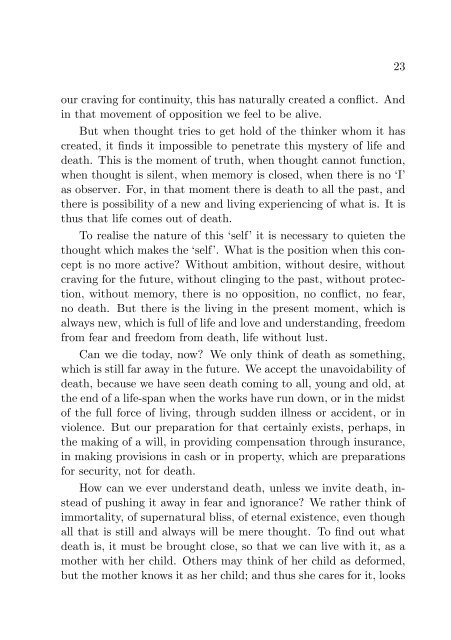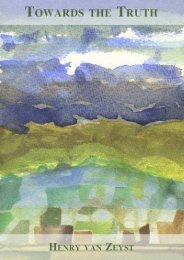Awareness in Buddhist Meditation
A detailed description of awareness in Buddhist Meditation.
A detailed description of awareness in Buddhist Meditation.
Create successful ePaper yourself
Turn your PDF publications into a flip-book with our unique Google optimized e-Paper software.
23<br />
our crav<strong>in</strong>g for cont<strong>in</strong>uity, this has naturally created a conflict. And<br />
<strong>in</strong> that movement of opposition we feel to be alive.<br />
But when thought tries to get hold of the th<strong>in</strong>ker whom it has<br />
created, it f<strong>in</strong>ds it impossible to penetrate this mystery of life and<br />
death. This is the moment of truth, when thought cannot function,<br />
when thought is silent, when memory is closed, when there is no ‘I’<br />
as observer. For, <strong>in</strong> that moment there is death to all the past, and<br />
there is possibility of a new and liv<strong>in</strong>g experienc<strong>in</strong>g of what is. It is<br />
thus that life comes out of death.<br />
To realise the nature of this ‘self’ it is necessary to quieten the<br />
thought which makes the ‘self’. What is the position when this concept<br />
is no more active? Without ambition, without desire, without<br />
crav<strong>in</strong>g for the future, without cl<strong>in</strong>g<strong>in</strong>g to the past, without protection,<br />
without memory, there is no opposition, no conflict, no fear,<br />
no death. But there is the liv<strong>in</strong>g <strong>in</strong> the present moment, which is<br />
always new, which is full of life and love and understand<strong>in</strong>g, freedom<br />
from fear and freedom from death, life without lust.<br />
Can we die today, now? We only th<strong>in</strong>k of death as someth<strong>in</strong>g,<br />
which is still far away <strong>in</strong> the future. We accept the unavoidability of<br />
death, because we have seen death com<strong>in</strong>g to all, young and old, at<br />
the end of a life-span when the works have run down, or <strong>in</strong> the midst<br />
of the full force of liv<strong>in</strong>g, through sudden illness or accident, or <strong>in</strong><br />
violence. But our preparation for that certa<strong>in</strong>ly exists, perhaps, <strong>in</strong><br />
the mak<strong>in</strong>g of a will, <strong>in</strong> provid<strong>in</strong>g compensation through <strong>in</strong>surance,<br />
<strong>in</strong> mak<strong>in</strong>g provisions <strong>in</strong> cash or <strong>in</strong> property, which are preparations<br />
for security, not for death.<br />
How can we ever understand death, unless we <strong>in</strong>vite death, <strong>in</strong>stead<br />
of push<strong>in</strong>g it away <strong>in</strong> fear and ignorance? We rather th<strong>in</strong>k of<br />
immortality, of supernatural bliss, of eternal existence, even though<br />
all that is still and always will be mere thought. To f<strong>in</strong>d out what<br />
death is, it must be brought close, so that we can live with it, as a<br />
mother with her child. Others may th<strong>in</strong>k of her child as deformed,<br />
but the mother knows it as her child; and thus she cares for it, looks

















